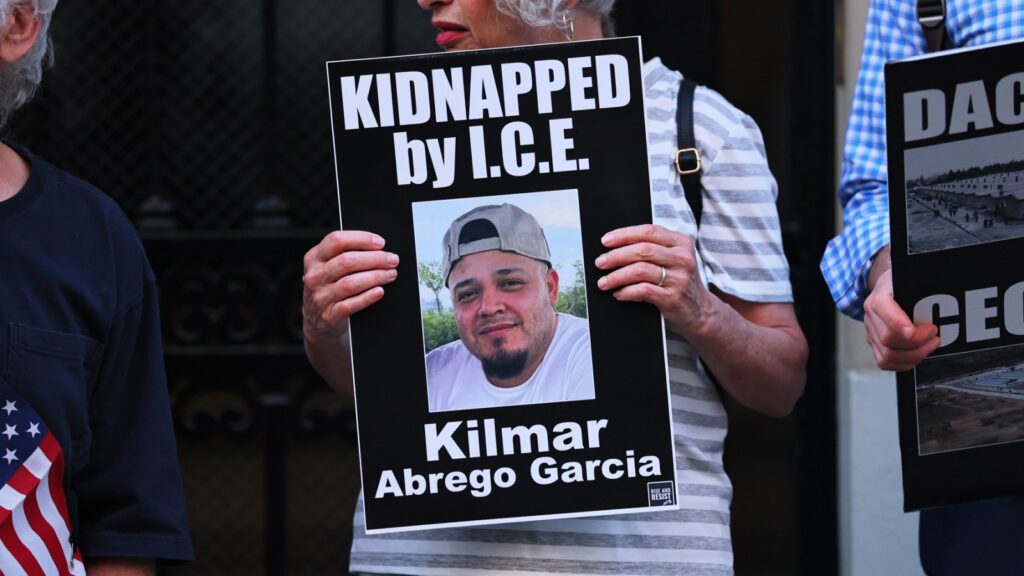
The U.S. government is poised to deport Kilmar Abrego Garcia once more, as their efforts to prosecute him on criminal charges face setbacks in court. This development follows a Maryland court hearing on Thursday, where the Justice Department indicated plans to detain Abrego Garcia through Immigration and Customs Enforcement (ICE) upon his release on bail.
Abrego Garcia, a resident of Maryland, was previously imprisoned in El Salvador under controversial circumstances. The Justice Department’s attorney, Jonathan Guynn, revealed that the government intends to deport him to a third-party nation, avoiding El Salvador due to a judge’s safety concerns. This plan aligns with a recent Supreme Court ruling allowing deportations to countries other than the individual’s origin, such as Libya or South Sudan, with minimal notice.
The Legal Quagmire
The Trump administration’s portrayal of Abrego Garcia as a dangerous criminal has been scrutinized, particularly after the Supreme Court mandated his return to the U.S. due to the unlawful nature of his initial deportation. This move was criticized as a political maneuver rather than a legitimate legal action.
In a significant legal blow to the government’s case, U.S. Magistrate Barbara D. Holmes ordered Abrego Garcia’s release on bail earlier this week. Her decision highlighted the weak foundation of the allegations, which included claims of his involvement with the MS-13 gang based on unreliable hearsay and implausible scenarios.
“The government cannot simply rely on the general reputation of a particular street gang to satisfy its burden,” Holmes stated. “The government’s evidence that Abrego is a member of MS-13 consists of general statements, all double hearsay […] the government’s evidence of Abrego’s alleged gang membership is simply insufficient.”
Implications of the Supreme Court Ruling
The Supreme Court’s decision to permit deportations to countries other than the individual’s origin is a pivotal factor in Abrego Garcia’s case. This ruling grants the administration considerable leeway in handling deportations, raising concerns about the potential for human rights violations.
Legal experts argue that this ruling could set a concerning precedent. According to immigration attorney Maria Sanchez, “The ability to deport individuals to third-party countries without thorough consideration of their safety is alarming. It undermines the principles of due process and could lead to severe human rights abuses.”
Historical Context and Human Rights Concerns
Abrego Garcia’s situation is reminiscent of past cases where individuals faced deportation to countries with questionable human rights records. These cases often highlight the tension between national security policies and international human rights obligations.
Human rights organizations have expressed apprehension over the potential implications of such deportations. Amnesty International’s recent report emphasized the risks associated with deporting individuals to unstable regions, where they may face persecution or violence.
Amnesty International warned, “Deporting individuals to countries with poor human rights records not only endangers their lives but also violates international human rights standards.”
Future Prospects and Legal Ramifications
The Justice Department’s current strategy appears to prioritize deportation over prosecution, raising questions about the administration’s commitment to due process. As Abrego Garcia’s legal battle continues, the case could become a focal point for broader discussions on immigration policy and human rights.
Looking ahead, the outcome of Abrego Garcia’s case may influence future legal and policy decisions regarding deportations and the treatment of individuals with contested immigration statuses. It remains to be seen how the administration will navigate these complex legal and ethical challenges.
As the situation unfolds, Abrego Garcia’s case serves as a stark reminder of the intricate interplay between immigration law, human rights, and political agendas. The implications of this case could resonate far beyond the immediate legal proceedings, shaping the discourse on immigration and human rights for years to come.





